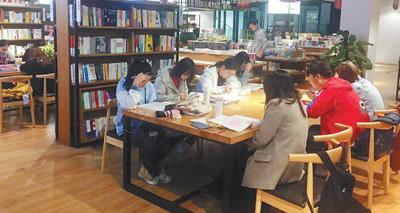


People read at the Xinhua bookstore in Jiangsu Normal University. (Photo/An Le)
Spending hours perusing campus bookstores is a precious memory for many college graduates. But in recent years, the popularity of digital reading and e-books has impacted the survival of many on-campus bookstores.
"Universities can't do without bookstores. Bookstores are an important part of campus history and culture. Without bookstores, a university is not complete," said Zhang Lei, an expert in the publishing industry.
Competing with new methods
With the in-depth development of nationwide reading, the lack of bookstores to cultivate cultural atmosphere attracted the attention of the government.
In July this year, the Ministry of Education issued a guideline to support the development of bookstores on campus, which requires "all colleges and universities to have at least one brick-and-mortar campus bookstore."
Thanks to the policy, universities may be able to welcome back more brick-and-mortar bookstores.
Since 2016, many bookstores have entered universities in new ways.
In Xuzhou University of Technology's bookstore, readers can choose books from the "optional reading area." Then, the book is sent to the school library automatically, where the students can then borrow it. In just one year, more than 8,000 books have been borrowed in this way.
Difficulties unique to the campus
An earlier survey by the Ministry of Education showed that more than half of universities do not have bookstores, and a quarter of all campus bookstores have closed in the past three years.
Campus bookstores are generally small in size, and many of them do not have independent legal status, so it is difficult to apply for government loans or support funds.
In addition, the campus bookstore has some disadvantages compared with those outside the university. For example, every summer and winter vacation, the number of visitors drops sharply, meaning many campus bookstores only open for 9 to 10 months every year.
In response to these difficulties, the guideline stipulates that universities should actively provide favorable conditions, such as giving discounts on rent, utilities and other daily operating expenses, and giving rewards to bookstores that serve teachers and students over a long period.
Finding its way
A bookstore in Beijing Language and Culture University has done well in recent years, increasing its profit by five times to 1 million yuan in just five years. The bookstore manager Cheng Zhou said that they could not compete with online bookstores when it comes to discounts, but they do have their advantages. For example, they have a full variety of books, specializing in foreign language teaching books. They also have a unique activity. Readers who come before 10:30 am can enjoy a 30 percent discount, which not only solves the problem of small passenger flow and low sales volume in the morning, but also solves the problem of concentrated passenger flow at noon.
At present, encouraged by the policy, the enthusiasm to build campus bookstores is on the rise. Zhang noted that these campus bookstores should use their strengths and keep in line with university spirit.
"Campus bookstores should not be the same, nor should they become a second campus library," he added.
In his opinion, an excellent campus bookstore should become a space for university students to grow beyond their dormitory, classroom and library, allowing them to "gain spiritual growth in the bookstore."
 Fire brigade in Shanghai holds group wedding
Fire brigade in Shanghai holds group wedding Tourists enjoy ice sculptures in Datan Town, north China
Tourists enjoy ice sculptures in Datan Town, north China Sunset scenery of Dayan Pagoda in Xi'an
Sunset scenery of Dayan Pagoda in Xi'an Tourists have fun at scenic spot in Nanlong Town, NW China
Tourists have fun at scenic spot in Nanlong Town, NW China Harbin attracts tourists by making best use of ice in winter
Harbin attracts tourists by making best use of ice in winter In pics: FIS Alpine Ski Women's World Cup Slalom
In pics: FIS Alpine Ski Women's World Cup Slalom Black-necked cranes rest at reservoir in Lhunzhub County, Lhasa
Black-necked cranes rest at reservoir in Lhunzhub County, Lhasa China's FAST telescope will be available to foreign scientists in April
China's FAST telescope will be available to foreign scientists in April "She power" plays indispensable role in poverty alleviation
"She power" plays indispensable role in poverty alleviation Top 10 world news events of People's Daily in 2020
Top 10 world news events of People's Daily in 2020 Top 10 China news events of People's Daily in 2020
Top 10 China news events of People's Daily in 2020 Top 10 media buzzwords of 2020
Top 10 media buzzwords of 2020 Year-ender:10 major tourism stories of 2020
Year-ender:10 major tourism stories of 2020 No interference in Venezuelan issues
No interference in Venezuelan issues
 Biz prepares for trade spat
Biz prepares for trade spat
 Broadcasting Continent
Broadcasting Continent Australia wins Chinese CEOs as US loses
Australia wins Chinese CEOs as US loses